- Home
- »
- Clothing, Footwear & Accessories
- »
-
3D Printed Jewelry Market Size, Share & Trends Report 2030GVR Report cover
![3D Printed Jewelry Market Size, Share & Trends Report]()
3D Printed Jewelry Market (2024 - 2030) Size, Share & Trends Analysis Report By Product (Necklace, Ring, Earring, Bracelet), By Distribution Channel (Online, Offline), By Region, And Segment Forecasts
- Report ID: GVR-4-68040-255-6
- Number of Report Pages: 85
- Format: PDF
- Historical Range: 2018 - 2023
- Forecast Period: 2024 - 2030
- Industry: Consumer Goods
- Report Summary
- Table of Contents
- Segmentation
- Methodology
- Download FREE Sample
-
Download Sample Report
3D Printed Jewelry Market Summary
The global 3D printed jewelry market size was estimated at USD 841.7 million in 2023 and is projected to reach USD 2,970.6 million by 2030, growing at a CAGR of 19.9% from 2024 to 2030. The rising trend of customization and personalization in the jewelry industry has led to an increased demand for unique, one-of-a-kind pieces, which 3D printing technology can readily accommodate.
Key Market Trends & Insights
- The Asia Pacific 3D printed jewelry market held a share of over 38.0% in 2023.
- The 3D printed jewelry market in the U.S. accounted for a share of 92.6% in 2023.
- Based on product, the 3D-printed ring segment accounted for a dominant share of 33.8% in 2023.
- Based on distribution channel, the offline distribution channel segment accounted for the largest share of around 68.6% in 2023.
Market Size & Forecast
- 2023 Market Size: USD 841.7 Million
- 2030 Projected Market Size: USD 2,970.6 Million
- CAGR (2024-2030): 19.9%
- North America: Largest market in 2023
In addition, advancements in 3D printing materials have expanded the range of possible designs, allowing for intricate and complex jewelry pieces that were previously challenging to produce using traditional methods. Another driving force is the efficiency and cost-effectiveness of 3D printing in jewelry production.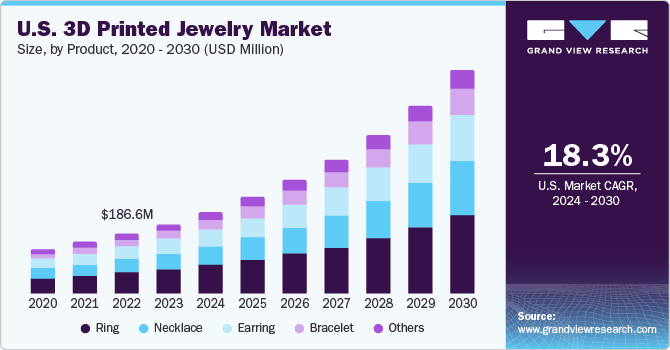
Traditional jewelry manufacturing processes often involve time-consuming and labor-intensive tasks, such as casting and molding. In contrast, 3D printing enables the rapid prototyping and production of designs, reducing lead times and production costs. This efficiency is particularly attractive for small-scale jewelry designers and independent artisans, allowing them to compete in the market with unique designs without the burden of high production costs. Furthermore, the sustainability aspect of 3D printing aligns with the growing consumer demand for eco-friendly and ethically sourced products.
3D printing generates less waste compared to traditional manufacturing methods, as it allows for precise material usage. This resonates with environmentally conscious consumers who prioritize sustainable practices and seek products with a smaller ecological footprint. In addition, technological advancements in 3D printing materials, such as the development of new alloys and polymers, contribute to the market's growth. These materials offer enhanced durability, flexibility, and aesthetic possibilities, expanding the range of jewelry designs that can be created through 3D printing.
Market Concentration & Characteristics
The adoption of 3D printing technology has allowed for unprecedented design freedom and customization in the creation of jewelry pieces. Designers can now experiment with intricate and complex designs that were previously challenging or impossible to produce using traditional methods.
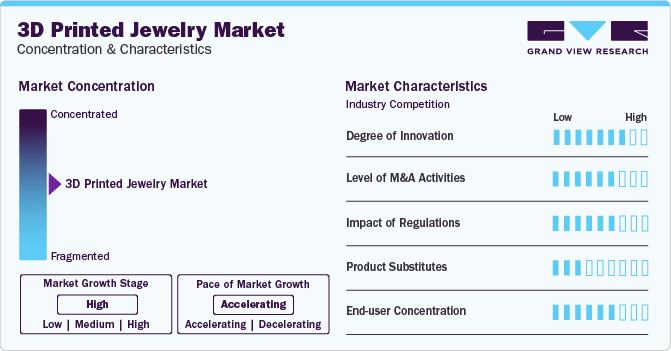
One of the key aspects contributing to the high degree of innovation is the ability to create highly detailed and precise structures with 3D printing. This technology enables jewelers to craft intricate patterns, textures, and shapes with a level of precision that surpasses traditional handcrafting techniques. As a result, consumers have access to a diverse range of unique and personalized jewelry options that cater to individual tastes and preferences.
The level of merger and acquisition (M&A) activities in the industry is currently moderate. As technology matures and market demand grows, companies are increasingly exploring strategic partnerships, acquisitions, and collaborations to enhance their capabilities, expand their product offerings, and gain a competitive edge.
Product Insights
The 3D-printed ring segment accounted for a dominant share of 33.8% in 2023. 3D printing allows for intricate and complex designs that would be challenging or impossible to achieve through traditional manufacturing methods. This has led to a surge in innovative and artistic ring designs that cater to a diverse range of tastes and aesthetics. The technology enables jewelry designers to push creative boundaries and experiment with unconventional shapes and patterns for rings, attracting customers who appreciate the novelty and uniqueness of these creations.
The 3D-printed necklace segment is expected to grow at a CAGR of 20.7% from 2024 to 2030. The technology itself has evolved significantly, making 3D printing more accessible and cost-effective for jewelers. This has allowed designers to experiment with intricate and personalized designs that were previously difficult or expensive to produce through traditional manufacturing methods.
Distribution Channel Insights
The offline distribution channel segment accounted for the largest share of around 68.6% in 2023. The offline distribution channel allows for personalized and expert assistance. In physical stores, customers can engage with knowledgeable staff who can guide them in terms of design, quality, and customization options. The expertise of in-store professionals adds a layer of trust and assurance for consumers, especially when making significant investments in high-value items like jewelry.
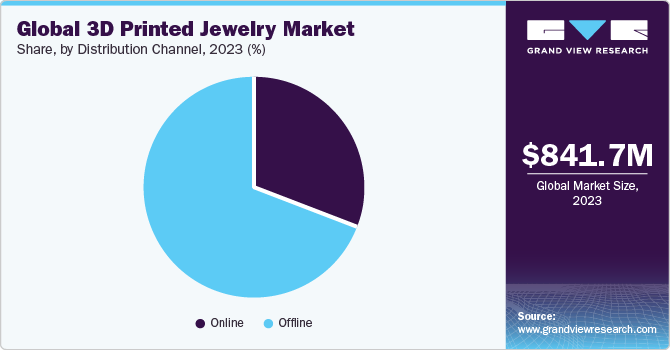
The online distribution channel segment is projected to grow at a CAGR of 21.5% from 2024 to 2030. The customization capabilities provided by online platforms play a crucial role in driving market demand. 3D technology allows customers to personalize jewelry designs according to their preferences, enabling a unique and tailored shopping experience. This level of customization is often challenging to achieve through traditional retail channels, making online platforms more attractive to consumers seeking personalized and distinctive jewelry pieces.
Regional Insights
The North America 3D printed jewelry market is projected to grow at a CAGR of 18.4 from 2024 to 2030. Consumers in North America are increasingly seeking personalized and one-of-a-kind jewelry pieces that reflect their individual styles and preferences. 3D printing enables designers and consumers to bring their unique visions to life, fostering a sense of exclusivity and personal connection with jewelry. This shift towards customization aligns with the broader trend in the retail market where consumers are valuing experiences and uniqueness over mass-produced items.
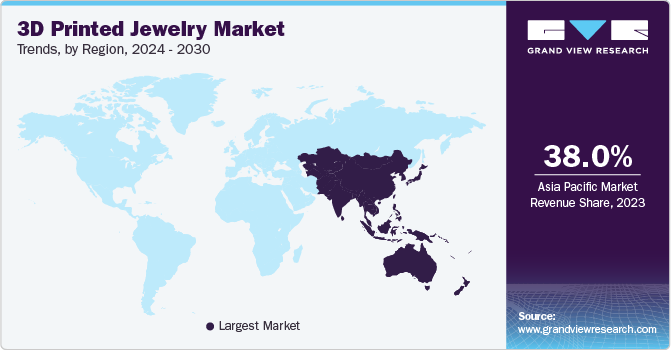
U.S. 3D Printed Jewelry Market Trends
The 3D printed jewelry market in the U.S. accounted for a share of 92.6% in 2023. The increasing accessibility and cost-effectiveness of 3D printing technology in recent years have emerged as significant drivers for market growth. This affordability has transformed 3D printing into a viable option for jewelry production, presenting a more economical alternative to traditional manufacturing methods. Consequently, this cost advantage empowers consumers to explore diverse designs and styles, encouraging experimentation and fostering a dynamic and accessible landscape within the U.S. jewelry industry.
Asia Pacific 3D Printed Jewelry Market Trends
The Asia Pacific 3D printed jewelry market held a share of over 38.0% in 2023. Technology offers greater design flexibility and agility to jewelry designers and manufacturers. Technological advancements in 3D printing technology have made it more accessible and cost-effective, allowing jewelry designers and manufacturers in the region to adopt this innovative manufacturing process. This has led to increased efficiency in production, reduced lead times, and the ability to create intricate & customized designs that were previously challenging with traditional methods.
Middle East & Africa 3D Printed Jewelry Market Trends
The 3D printed jewelry market in Middle East & Africa is expected to grow at a CAGR of 16.5% from 2024 to 2030. The increasing disposable income and changing consumer lifestyles in have led to a higher demand for personalized and avant-garde fashion accessories in the region. 3D-printed jewelry not only offers a novel and customizable option but also aligns with sustainability concerns, as it enables less material wastage compared to traditional jewelry manufacturing methods.
Key 3D Printed Jewelry Company Insights
The competitive landscape of the global 3D printed jewelry market is dynamic and multifaceted, featuring the presence of established players alongside a rising number of innovative startups and niche designers. Key established players continue to drive market growth through their extensive experience, robust distribution networks, and ongoing technological advancements. At the same time, the market is witnessing the emergence of a new wave of 3D printing jewelry startups, leveraging cutting-edge technology and novel designs to capture market share and appeal to a younger, more design-conscious demographic.
Key 3D Printed Jewelry Companies:
The following are the leading companies in the 3D printed jewelry market. These companies collectively hold the largest market share and dictate industry trends.
- Imaginarium
- MIRAKIN
- EnvisionTEC
- NERVOUS SYSTEM
- RADIAN
- Shapeways, Inc.
- Stratasys
- Materialise
- OLA
- Diana Law Printed Accessories
Recent Developments
-
In October 2022, Christian Tse and Formula 3D partnered with Desktop Metal to launch 3D printing of 925 sterling silver jewelry
-
In November 2021, LACE by Jenny Wu launched a new collection of 3D-printed carbon fiber jewelry in collaboration with Impossible Objects. The collection includes earrings and bracelets made using composite-based additive manufacturing technology
3D Printed Jewelry Market Report Scope
Report Attribute
Details
Market size value in 2024
USD 1001.1 million
Revenue forecast in 2030
USD 2,970.6 million
Growth Rate (Revenue)
CAGR of 19.9% from 2024 to 2030
Historical data
2018 - 2023
Forecast period
2024 - 2030
Quantitative units
Revenue in USD million and CAGR from 2024 to 2030
Report coverage
Revenue forecast, company ranking, competitive landscape, growth factors, and trends
Segments covered
Product, distribution channel, region
Regional scope
North America; Europe; Asia Pacific; Central & South America; Middle East & Africa
Country scope
U.S.; Canada; Mexico; Germany; UK; Spain; Italy; France; China; India; Japan; South Korea; Australia & New Zealand; Brazil; Argentina; South Africa; Saudi Arabia
Key companies profiled
Imaginarium; MIRAKIN; EnvisionTEC; NERVOUS SYSTEM; RADIAN; Shapeways, Inc.; Stratasys; Materialise; OLA; Diana Law Printed Accessories
Customization scope
Free report customization (equivalent up to 8 analysts working days) with purchase. Addition or alteration to country, regional & segment scope
Pricing and purchase options
Avail customized purchase options to meet your exact research needs. Explore purchase options
Global 3D Printed Jewelry Market Report Segmentation
This report forecasts revenue growth at the global, regional, and country levels and provides an analysis of the latest industry trends and opportunities in each of the sub-segments from 2018 to 2030. For this study, Grand View Research has segmented the global 3D printed jewelry market report on the basis of product, distribution channel, and region:
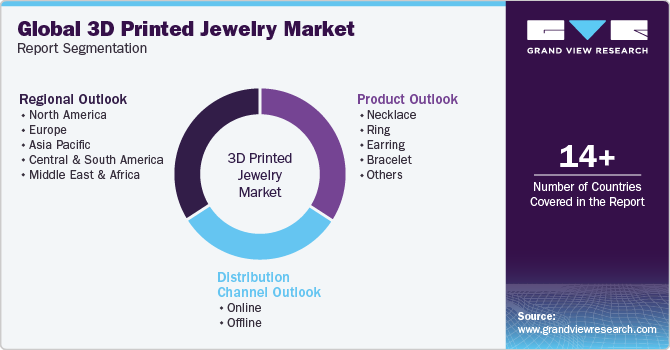
-
Product Outlook (Revenue, USD Million, 2018 - 2030)
-
Necklace
-
Ring
-
Earring
-
Bracelet
-
Others
-
-
Distribution Channel Outlook (Revenue, USD Million, 2018 - 2030)
-
Online
-
Offline
-
-
Regional Outlook (Revenue, USD Million, 2018 - 2030)
-
North America
-
U.S.
-
Canada
-
Mexico
-
-
Europe
-
Germany
-
UK
-
Spain
-
Italy
-
France
-
-
Asia Pacific
-
China
-
India
-
Japan
-
South Korea
-
Australia & New Zealand
-
-
Central & South America
-
Brazil
-
Argentina
-
-
Middle East & Africa
-
South Africa
-
Saudi Arabia
-
-
Frequently Asked Questions About This Report
b. The global 3D printed jewelry market size was estimated at USD 841.7 million in 2023 and is expected to reach USD 1,001.1 million in 2024.
b. The global 3D printed jewelry market is expected to grow at a compounded growth rate of 19.9% from 2024 to 2030 to reach USD 2,970.6 million by 2030.
b. Ring accounted for a share of 33.8% of the global revenues in 2023. 3D printing allows for intricate and complex designs that would be challenging or impossible to achieve through traditional manufacturing methods. This has led to a surge in innovative and artistic ring designs that cater to a diverse range of tastes and aesthetics.
b. Some key players operating in 3D printed jewelry market are Imaginarium, MIRAKIN , EnvisionTEC , NERVOUS SYSTEM, RADIAN, Shapeways, Inc. , Stratasys, Materialise, OLA, and Diana Law Printed Accessories.
b. Consumers today seek unique and individualized pieces that reflect their personal style and preferences. 3D printing allows designers to create intricate and detailed jewelry designs that would be challenging or impossible to produce through traditional manufacturing methods. This level of customization appeals to a diverse range of customers looking for one-of-a-kind pieces.
Share this report with your colleague or friend.
Need a Tailored Report?
Customize this report to your needs — add regions, segments, or data points, with 20% free customization.

ISO 9001:2015 & 27001:2022 Certified
We are GDPR and CCPA compliant! Your transaction & personal information is safe and secure. For more details, please read our privacy policy.
Trusted market insights - try a free sample
See how our reports are structured and why industry leaders rely on Grand View Research. Get a free sample or ask us to tailor this report to your needs.










